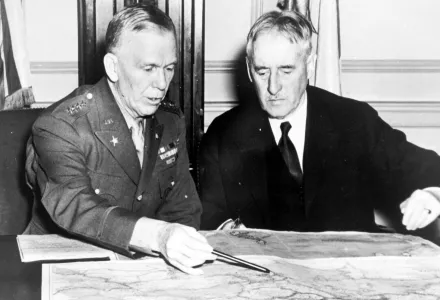
Belfer Center Fellow Grant H. Golub discussed the World War II–era expansion of the now-defunct U.S. Department of War during a virtual seminar on Thursday.
The seminar focused on chapter three of Golub's dissertation, which argues Stimson drastically expanded the influence of the War Department in American politics. Golub, a Ph.D. candidate in International History at the London School of Economics, serves as an Ernest May Fellow at the Harvard Kennedy School’s Belfer Center for Science and International Affairs while he completes his dissertation on the War Department's transformation into a key political player.
Golub highlighted U.S. Secretary of War Henry L. Stimson's far-reaching organizational reform, which reduced the severe infighting that had crippled the military and left it "on the fringes of policy making."
"These personal and policy differences really impacted the War Department's ability to shape policy at all," Golub said. "They basically spent more time fighting one another than they did trying to convince the president or other parts of the Roosevelt administration — let alone Congress — to follow any of their presidential or political advice."
Stimson managed public relations and created the Cabinet Defense Council, which held weekly meetings to coordinate foreign policy among department leaders. Additionally, Stimson's War Department lobbied Congress and President Franklin D. Roosevelt, Class of 1904, to institute conscription under the Selective Service Act of 1940 — though the department had not historically engaged in lobbying.
Ultimately, Stimson's reforms increased the political power of the War Department from its previous state of "bureaucratic infighting" to its current position as a critical political actor, Golub explained.
He added, however, that few today are aware of the extent of the military's political influence.
"One of the most pernicious myths about the American military is that it's apolitical," Golub said. “But they have their own political and policy objectives, and they work to try and enact them."
During a Q&A session after the presentation, audience members asked Golub about critiques of Stimson's tenure, including his rumored support for the atomic bomb....
Gritzbach, Michael, Emily L. Ding, Julia A. Maciejak and Makanaka Nyandoro."Belfer Center Fellow Discusses Political Influence of U.S. War Department." Harvard Crimson, October 17, 2022.
The full text of this publication is available via Harvard Crimson.



